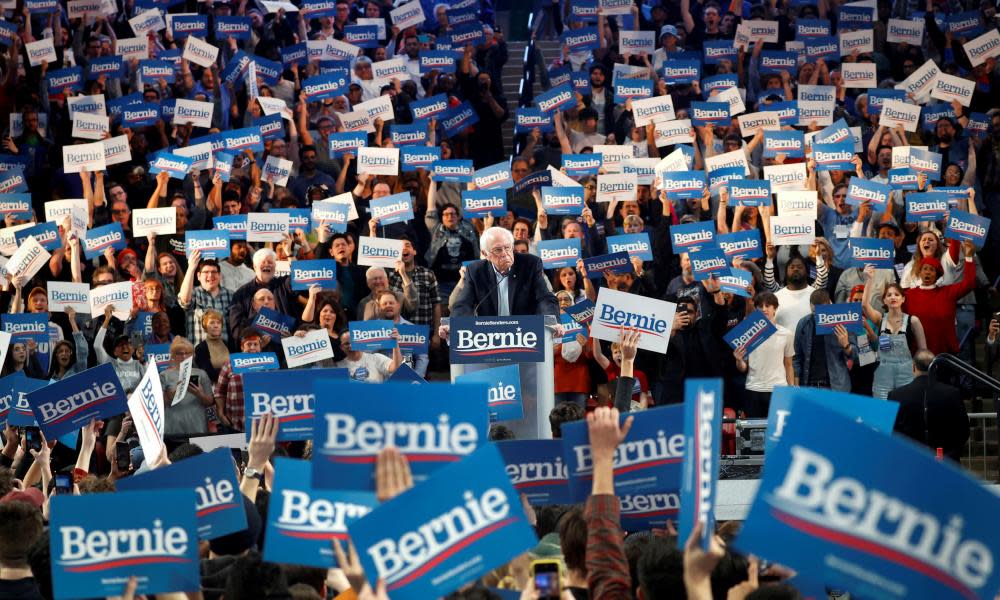Bernie Sanders’ political revolution is not over

In his speech dropping out of the 2020 presidential race, Bernie Sanders quoted Martin Luther King Jr: “The arc of the moral universe is long, but it bends toward justice.” The long “fight for justice”, Sanders continued, “is what our movement remains about.”
His use of the present tense stood out. This wasn’t an ordinary concession speech, but this wasn’t an ordinary campaign or candidate, either.
Bernie Sanders began his career in obscurity, first as a member of the Young People’s Socialist League, and then as a minor third-party candidate garnering just 2% of the vote while railing against the “world of the 2%” that controlled America’s wealth.
He didn’t create the anger at an unjust economic system or the disillusionment with liberal politics, but he did create a clear narrative of what’s wrong
The Sanders message wasn’t carefully focus-grouped or cobbled together by “experts” – it came from his distinctly socialist understanding of how the world operated: the powerful will always get the better of the weak unless the weak get organized and fight back. With his moral clarity and anger, the Vermont senator seemed like the last specimen of a dying politics. He was stubborn; he refused to change, to “evolve” as the political climate turned.
But at a time when mainstream Democrats were telling everyone that we could bootstrap ourselves to prosperity, America’s brutal class system didn’t evolve, either. With millions in poverty or feeling the pangs of hunger in the richest society in history, with millions more jobless, without health insurance, indebted and treated as expendable, Sanders knew there was an audience for his message.
Since April 2015, Bernie Sanders has managed to conjure that potential audience into an actual one. He didn’t create the anger at an unjust economic system or the decades of disillusionment with liberal politics, but he did create a clear narrative of what’s wrong, build support for a set of policies that could make things better, and identify the agents of change that could bring a sorely needed “political revolution” to fruition.
Related: We can't rely on Trump in this unprecedented crisis. Congress must lead the way | Bernie Sanders
The core of the Sanders platform has become common sense for millions of Americans. As he put it in his Wednesday morning speech: “We are winning the ideological battle.”
Medicare for All, free university and trade school tuition, universal childcare, fair trade and the protection of good jobs, living wages, and a Green New Deal that foregrounds the needs of workers – the most central parts of Sanders’ agenda are now all widely popular ideas.
And never has it beeen clearer who the enemies of progress are. Seventy per cent of Americans support higher taxes on those earning over $10m now, including 54% of Republicans.
Imagine the shock of Democratic operatives who discovered during Sanders’ rise that defending the material needs of working people is actually popular among working people.
But Sanders fell short on the last part of his mission – mobilizing the coalition his political revolution counted on. He needed infrequent voters to turn out, and despite his early success, those voters didn’t materialize. Decades of defeat and disorganization were almost overcome in a matter of months, but almost is scant consolation.
There’s still hope for the millions compelled to vote, canvass, phone-bank, and text for the Bernie Sanders campaign. As the present tense in his speech yesterday indicated, he sees himself as not a conventional candidate but a member of a mass movement. He said that “this race has never been about me” and that he “ran for the presidency because [he] believed as president [he] could accelerate and institutionalize the progressive change that we are all building together”.
Bernie Sanders had hoped that he would emerge out of 2020 as a figure with the power of Franklin Delano Roosevelt, capable of using state power to institute reforms and clear away obstacles to working-class organizing. Instead, he’ll have to accept his place alongside Martin Luther King Jr, Eugene Debs, and Mother Jones – moral leaders against the great evils of their day, leaders who will continue to inspire the struggle for freedom and justice.
Bhaskar Sunkara is the founding editor of Jacobin magazine and a Guardian US columnist. He is the author of The Socialist Manifesto: The Case for Radical Politics in an Era of Extreme Inequality

